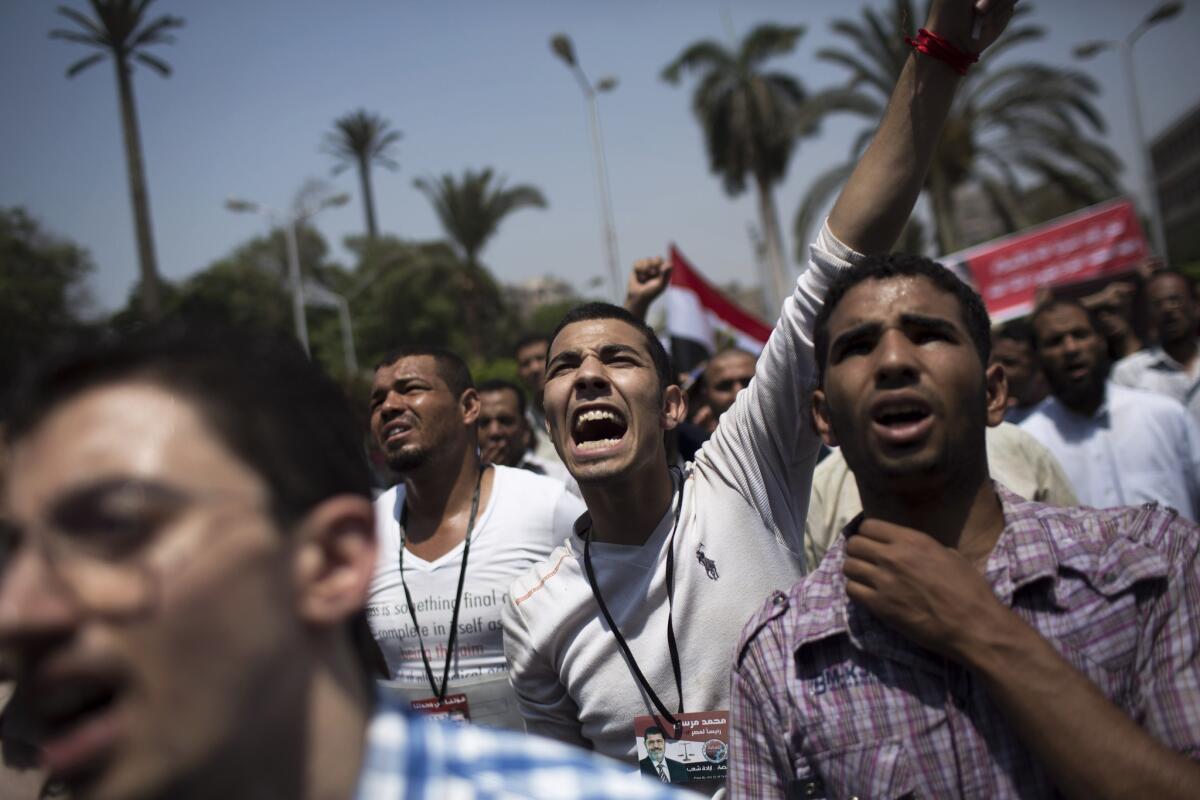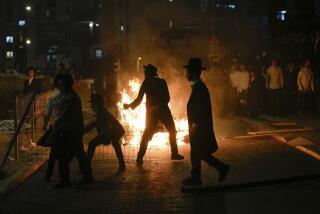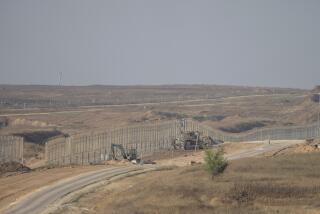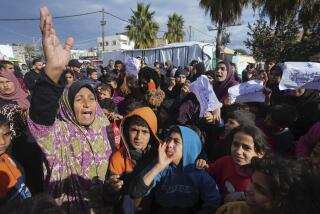Egypt’s Muslim Brotherhood calls for national uprising

CAIRO -- The political wing of the Muslim Brotherhood called for a national uprising in retaliation for an attack by Egyptian security forces Monday that killed at least 42 anti-military protesters during morning prayers.
The Freedom and Justice Party “calls on the great Egyptian people to rise up against those who want to steal their revolution with tanks and armored vehicles, even over the dead bodies of the people,” it said in a statement.
The announcement was a chilling indication of how polarized and dangerous the nation has become in a power struggle between the armed forces and the supporters of former President Mohamed Morsi, a Brotherhood member who last week was deposed in a military coup.
It is not clear what led to the violence that also injured hundreds of people near the headquarters of the Republican Guard, where pro-Morsi supporters have staged a sit-in for days. Authorities said a “terrorist group” attempted to storm the headquarters, firing weapons, hurling Molotov cocktails and killing one soldier and two policemen.
The Brotherhood called the attack a “horrible massacre” and said “this has never happened before in the history of the Egyptian army.”
Witnesses said demonstrators fled through tear gas and shotgun pellets, the dead and wounded ferried away by motorcycles, ambulances and in the arms of relatives. Some said the shooting started during prayers, others said gunfire broke out moments after the morning ritual.
“While we prayed, they shot us,” said Fatma Alzomor, who wailed near the Rabaa Al Adawiya mosque, about two miles away from the Republican Guard facility. “Witness, free world, what is happening. We are being sprayed with blood. You must hear me.”
A man standing nearby told a journalist: “Write this: Today, freedom has been killed.”
Images of the dead lying beneath sheets and national flags inflamed a nation already on the brink. The military coup that deposed Morsi last week infuriated his Brotherhood supporters, who have vowed not to leave the streets until the president, believed to be held by the Republican Guard, returns to office.
“We were praying at 3:30 a.m. when we were surprised by gun fire and tear gas all around us,” said Mahmoud Mohammed, a lawyer who was shot in the arm. “We had women and children with us. The shooting went on for a long time. They didn’t give us a chance to retreat. They met us from every direction.”
Men wearing hard hats and carrying sticks, clubs and knives guarded the street leading to the mosque, where over the last week thousands of Morsi supporters have camped in tents. Boys carried shields; bandaged men curled in the shade; women wept from behind face veils, and the summer heat of a new day rose through the murmurs of clerics.
“I was praying,” said Dr. Ismail Hashish, a surgeon at a makeshift field hospital. “We heard screams from the stage of the mosque, telling the protesters not to go to the Republican Guard. I myself have seen nine dead. We have a huge number of cases. A lot of gunshot wounds to the chest and head. The casualties became much greater than what we could handle.”
The incident further jolted the nation’s political disarray.
The military-installed president and disparate political parties have yet to agree on a prime minister. The killings also created a new danger for the military after the ultraconservative Salafis in the prominent Nour Party withdrew from negotiations for a coalition government. Nour was an adversary of the Brotherhood but now, under pressure from Islamists, may move closer to the group.
Opposition figures who backed the coup were careful in how they worded statements on Monday’s attack.
“Violence begets violence and should be strongly condemned. Independent Investigation a must. Peaceful transition is only way,” Mohamed ElBaradei, a Morsi foe and Nobel Peace Prize winner, said on his official Twitter account.
The Brotherhood was shaken and enraged. After one year of controlling the government, it has reverted back to its old role as the opposition under growing pressure from a military determined to clip its influence, even as the economy tumbles, and crime and social unrest spread.
“What happened today is a massacre,” Essam Erian, deputy leader of the Freedom and Justice Party, said outside the field hospital. “They [the military] brought this on themselves. To this chaos there is no exit unless Mohamed Morsi returns to office. There is no exit. ... Our blood will overcome their weapons.”
ALSO:
Morsi supporters say Egyptian army attack was unprovoked
Ex-China railways minister given death sentence in corruption case
The Week Ahead: EU-U.S. trade talks, Japan nukes, Snowden scandal
Special correspondent Ingy Hassieb contributed to this report.
More to Read
Sign up for Essential California
The most important California stories and recommendations in your inbox every morning.
You may occasionally receive promotional content from the Los Angeles Times.











